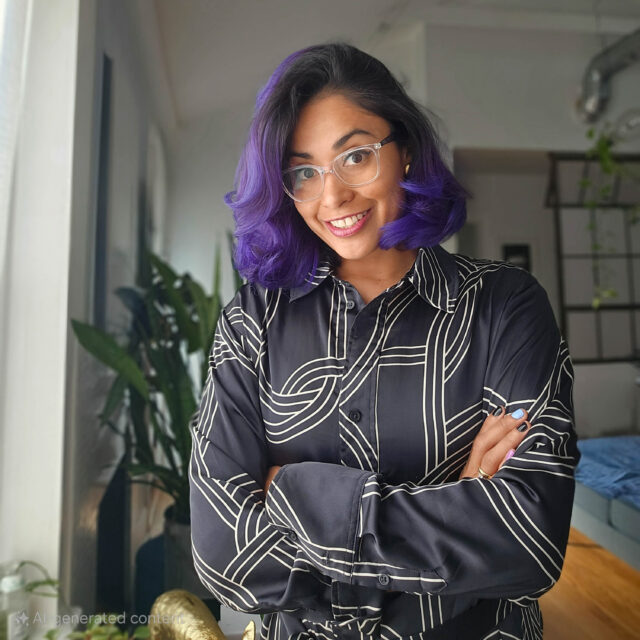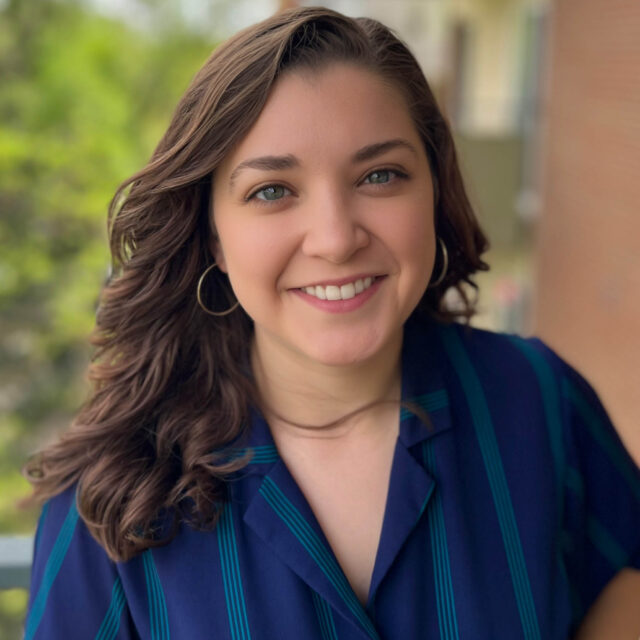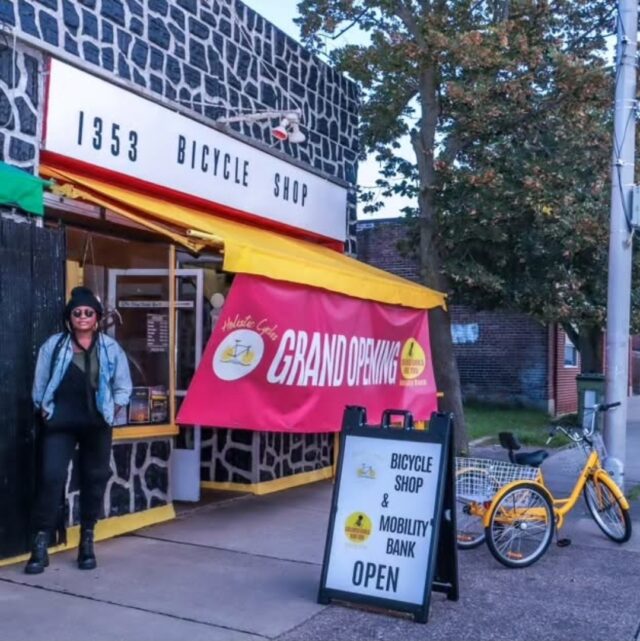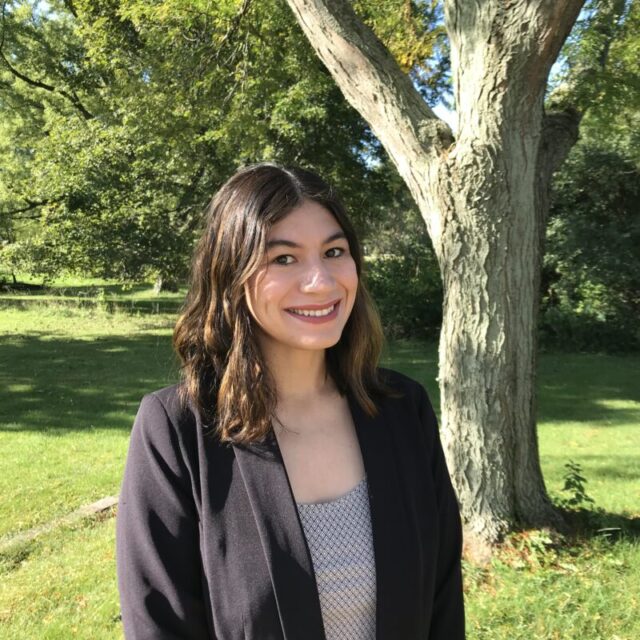Transportation Justice Fellow Spotlight: Adriana Lopez Hernandez, Elizabeth Santiago, Jalonda Hill, and Diana Voss-Gonzalez
by Odochi Akwani, Writer and Content Manager
May 22, 2025
As part of a monthly series leading up to the 2025 NACTO Designing Cities Conference in Washington, D.C., we’re highlighting this year’s fellows to learn more about them and their work.
The Transportation Justice Fellowship, organized by NACTO as part of the Better Bike Share Partnership, builds community and skills among early- and mid-career people of color working to embed mobility justice in transportation. The Fellowship supports members of the cohort as they do the heavy work of operationalizing equity across the transportation field.
This month, we’d like to introduce fellows Adriana Lopez Hernandez, transportation consultant/sustainable mobility advocate; Elizabeth Santiago, vision zero program administrator at the City of Denver Department of Transportation and Infrastructure; Jalonda Hill, founder and board president of Colored Girls Bike Too; and Diana Voss-Gonzalez, program manager at the Shared-Use Mobility Center.
Read their interviews below to learn how they each got into transportation, why transportation justice is important to them, and what their lives look like in Phoenix, Denver, Buffalo, and Los Angeles.
WHAT LED YOU TO PURSUE A CAREER IN TRANSPORTATION?
 “My interest in transportation began during university when I relied on a metro line to commute between home, work, and classes. I noticed how fellow passengers used that time — eating, studying, parenting — revealing how commutes shape daily life. Many spend up to 20 hours a week commuting, often at the cost of their own health, time to pursue their activities, or to be able to spend some quality time with their loved ones. Later, living in Berlin, I experienced a transit system that was reliable, integrated, and user-friendly — even in extreme cold. The local transit app, as early as 2013, offered real-time planning, contingency plans, and seamless transfers. That contrast showed me how well-designed systems can improve quality of life, and it inspired me to pursue a career focused on building better, more equitable transportation solutions.” – Adriana Lopez Hernandez
“My interest in transportation began during university when I relied on a metro line to commute between home, work, and classes. I noticed how fellow passengers used that time — eating, studying, parenting — revealing how commutes shape daily life. Many spend up to 20 hours a week commuting, often at the cost of their own health, time to pursue their activities, or to be able to spend some quality time with their loved ones. Later, living in Berlin, I experienced a transit system that was reliable, integrated, and user-friendly — even in extreme cold. The local transit app, as early as 2013, offered real-time planning, contingency plans, and seamless transfers. That contrast showed me how well-designed systems can improve quality of life, and it inspired me to pursue a career focused on building better, more equitable transportation solutions.” – Adriana Lopez Hernandez
 “Public health! While pursuing my MPH [Master of Public Health], I became increasingly curious about how urban planning and design influence health outcomes. While I had some understanding of this from personal experience, it wasn’t until graduate school that I began to deeply examine and think more critically about the relationship between public health and the built environment. The more I explored, the more I came to appreciate transportation as a social determinant of health. Access to safe, reliable, and affordable transportation is an intersectional public health issue. I enjoy being able to work across sectors in creating healthier, more connected communities.” – Elizabeth Santiago
“Public health! While pursuing my MPH [Master of Public Health], I became increasingly curious about how urban planning and design influence health outcomes. While I had some understanding of this from personal experience, it wasn’t until graduate school that I began to deeply examine and think more critically about the relationship between public health and the built environment. The more I explored, the more I came to appreciate transportation as a social determinant of health. Access to safe, reliable, and affordable transportation is an intersectional public health issue. I enjoy being able to work across sectors in creating healthier, more connected communities.” – Elizabeth Santiago
 “My journey into transportation was not a planned career path but a profound personal transformation. After returning to Buffalo from law school in 2016, I entered the holistic health industry. During this time, I faced a tragic loss that propelled me to reclaim my liberation as a Black woman — politically, spiritually, and within my community. Biking became my bridge to this liberation, symbolizing a minimalist, sustainable lifestyle centered on healing, health, justice and community building. This passion led me to establish Colored Girls Bike Too, a grassroots initiative that has since evolved into a 501(c)(3) organization encompassing Holistic Cycles, a community bike shop, and a mobility bank.” – Jalonda Hill
“My journey into transportation was not a planned career path but a profound personal transformation. After returning to Buffalo from law school in 2016, I entered the holistic health industry. During this time, I faced a tragic loss that propelled me to reclaim my liberation as a Black woman — politically, spiritually, and within my community. Biking became my bridge to this liberation, symbolizing a minimalist, sustainable lifestyle centered on healing, health, justice and community building. This passion led me to establish Colored Girls Bike Too, a grassroots initiative that has since evolved into a 501(c)(3) organization encompassing Holistic Cycles, a community bike shop, and a mobility bank.” – Jalonda Hill
 “In 2017, I was a victim of a hit-and-run while biking to the nearest bus stop on Vermont Avenue in Los Angeles. It was the first day of my internship, and since I didn’t have a car, the bus stop was just far enough to walk. And honestly, I didn’t feel safe walking alone at 5:00 a.m., so I opted to bike instead. Fortunately, I recovered and continued my internship. For the next eight months, I commuted from the east side to the west side, six days a week. The commute took almost two hours and involved biking to make the first- and last-mile connections, along with two-to-three bus transfers depending on the time of day. Many people often say, ‘Everyone drives in LA,’ and while that may be true for a large portion of residents, there are still many who rely on public transit to get around.” – Diana Voss-Gonzalez
“In 2017, I was a victim of a hit-and-run while biking to the nearest bus stop on Vermont Avenue in Los Angeles. It was the first day of my internship, and since I didn’t have a car, the bus stop was just far enough to walk. And honestly, I didn’t feel safe walking alone at 5:00 a.m., so I opted to bike instead. Fortunately, I recovered and continued my internship. For the next eight months, I commuted from the east side to the west side, six days a week. The commute took almost two hours and involved biking to make the first- and last-mile connections, along with two-to-three bus transfers depending on the time of day. Many people often say, ‘Everyone drives in LA,’ and while that may be true for a large portion of residents, there are still many who rely on public transit to get around.” – Diana Voss-Gonzalez
WHY IS TRANSPORTATION JUSTICE IMPORTANT TO YOU?
“Transportation justice matters because when we plan for communities historically underserved, we’re not just correcting past harms — we’re enabling access to basic human rights. Reliable, safe transport allows people to reach education, healthcare, and meet essential needs. But it goes beyond: access to parks, cultural spaces, and community centers supports mental health, builds social capital, and improves well-being. It connects people across backgrounds and creates more inclusive, vibrant cities. The city itself becomes a welcoming third space.” – Adriana Lopez Hernandez
“Currently, my work is primarily focused on transportation safety. For decades, car-centric development has critically endangered communities by prioritizing speed over safety and neglecting the needs of most road users. The consequences of these decisions have disproportionately impacted BIPOC communities and neighborhoods with lower incomes, placing them most at risk of being seriously injured or harmed on our roadways. An approach rooted in justice is essential in understanding and effectively addressing the legacy of transportation injustice.” – Elizabeth Santiago
“Transportation justice is crucial because it addresses systemic inequities that disproportionately affect Black, Brown, and Indigenous communities. Yet, this area of justice work is often overlooked and undervalued. Access to reliable and affordable transportation is fundamental to accessing education, employment, healthcare, and social opportunities. Without equitable transportation options, marginalized communities face compounded barriers to upward mobility and well-being. At Colored Girls Bike Too, we recognize that transportation is not just about movement; it’s about liberation, dignity, and the right to thrive.” – Jalonda Hill
“Transportation justice encourages us to reflect on the systems that enable and perpetuate car-centric transportation over people-focused systems. Every person — whether they are pedestrians, cyclists, or non-drivers — regardless of age or ability, has the right to move freely and safely around their towns and cities. We need to think about transportation in a holistic way, one that addresses the needs and realities of all road users, especially the more vulnerable.” – Diana Voss-Gonzalez
WHAT DO YOU ENJOY MOST ABOUT WHERE YOU LIVE?
“Phoenix is the ninth city I’ve lived in, and although I’m still in the early stages of getting to know it, I’ve been pleasantly surprised. I arrived without a car and have been able to move freely using my bike, transit, and scooters — covering more than 1,700 km so far. What I enjoy most is the growing active mobility infrastructure: protected bike lanes, canal paths, and a welcoming cycling community. The light rail has been a reliable backbone, and I’m encouraged to see transit service expanding. Access to parks and nearby mountains adds to the quality of life. It’s not perfect, but Phoenix offers real potential for a more sustainable, connected way of living.” – Adriana Lopez Hernandez
“I love walking around and exploring Denver’s parks and neighborhoods. The city has a rich cultural history and vibrant arts scene, and there’s no shortage of great places to eat and fun things to do.” – Elizabeth Santiago
“Buffalo is a city ripe with potential and innovation, especially within the cycling community. Despite historical underdevelopment, there’s a vibrant spirit of creativity and resilience. The proximity to Canada adds a unique cultural dimension, and as the second-largest city in New York State, Buffalo offers a blend of urban amenities and community-centric living. It’s a place where grassroots initiatives can flourish, and where we can actively contribute to shaping a more equitable and sustainable future.” – Jalonda Hill
“I currently live in downtown LA. One of the aspects I love the most about this location is having quick access to multiple modes of transportation. I can choose between walking, cycling, riding the subway, or the bus to get to the majority of the places I need or want to go. Downtown LA sometimes gets a bad rep, even from people in LA, but the truth is that DTLA is a very diverse, vibrant, and fun neighborhood, with a community that truly cares about each other, and that extends to our local businesses, community organizations, parks, trees, and even our streets.” – Diana Voss-Gonzalez
WHAT’S YOUR FAVORITE WAY TO SPEND A WEEKEND?
“My ideal weekend includes a long bike ride with a group. I particularly enjoy riding with strong women — climbing hills, taking in the views, and exploring new neighborhoods. I love noticing seasonal changes, discovering great meals, and spending quality time with friends and family. I also enjoy reading about urban planning, transportation, data science, gender equity, and social justice. My Latin roots are a perfect excuse to enjoy music and dance whenever I can. I’m lucky to share these moments with my husband and our two dogs, who are always up for an adventure.” – Adriana Lopez Hernandez
“Outside. With my wife and a book and without a care.” – Elizabeth Santiago
“Weekends are a time to nourish the body, mind, and spirit. I delight in savoring good food, creating and performing music, and embracing the outdoors. During warmer months, I often ride my bike downtown to Buffalo’s waterfront, where I meditate, stretch, and bask in the sun’s warmth. Connecting with friends, attending community events, and supporting local businesses are integral to my weekends, as they reinforce the bonds that make our community strong and vibrant.” – Jalonda Hill
“A meal at one of my favorite restaurants or coffee shops, paired with an outdoor activity, sometimes hiking, other times paddle boarding, and some others, snowboarding. We have fantastic weather pretty much all year round, so it is hard to stay indoors.” – Diana Voss-Gonzalez
___________________________________________________________________________________________
The Better Bike Share Partnership is funded by The JPB Foundation as a collaboration between the City of Philadelphia, the National Association of City Transportation Officials (NACTO), and the PeopleForBikes Foundation to build equitable and replicable bike share systems. Follow us on LinkedIn, Facebook, Twitter, and Instagram, or sign up for our weekly newsletter.
Have a question or a story idea? Email odochi@peopleforbikes.org.
